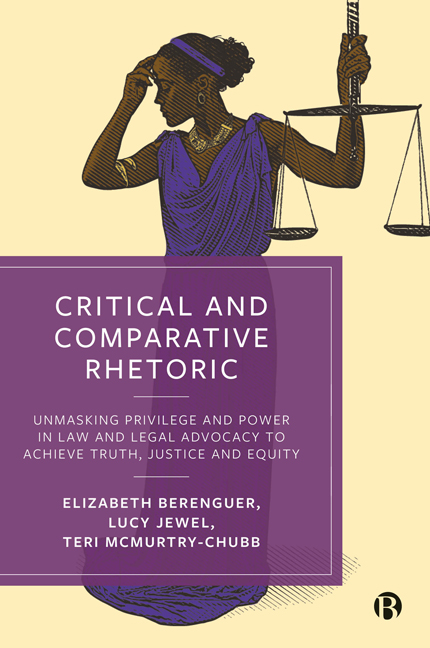 Critical and Comparative Rhetoric
Critical and Comparative Rhetoric Book contents
- Frontmatter
- Contents
- Detailed Contents
- List of Figures and Tables
- About the Authors
- Introduction
- 1 What’s Wrong with Aristotle?
- 2 Problematizing Aristotle: Renovating and Remodeling Traditional Legal Rhetoric
- 3 Shifting the Focus from the West
- 4 Multicultural Rhetorics
- 5 Reproducing the Canon, Reproducing Inequity (Traditional Rhetoric)
- 6 Interrupting the Canon
- 7 Disrupting the Canon: Multicultural Rhetorical Strategies in Action
- References
- Index
4 - Multicultural Rhetorics
Published online by Cambridge University Press: 18 January 2024
- Frontmatter
- Contents
- Detailed Contents
- List of Figures and Tables
- About the Authors
- Introduction
- 1 What’s Wrong with Aristotle?
- 2 Problematizing Aristotle: Renovating and Remodeling Traditional Legal Rhetoric
- 3 Shifting the Focus from the West
- 4 Multicultural Rhetorics
- 5 Reproducing the Canon, Reproducing Inequity (Traditional Rhetoric)
- 6 Interrupting the Canon
- 7 Disrupting the Canon: Multicultural Rhetorical Strategies in Action
- References
- Index
Summary
The making of multicultural legal reasoning and analytic paradigms
As discussed in the previous chapters, legal rhetoric operates to inculcate White cultural hegemony into our reasoning and analytic processes for resolving legal problems— how we “do” law. It makes its racialized tools normative and renders them neutral through its failure to acknowledge their origins in Western epistemologies and ontologies that idolize and protect imperialism, capitalism, White supremacy, and patriarchy. The lens through which legal rhetoric views the landscape of legal conflict is focused on White racial and cultural experiences. These experiences are rendered monolithic in the machinations of legal reasoning and analysis insomuch as they become synonymous with the maintenance of power in White supremacist terms— White cultural hegemony. This singular focus renders historic and contemporaneous cultural experiences blurry and unformed, when in fact, Indigenous, Black, Latine, and Asian communities have forged formal rhetorical traditions imbued with their culture and experiences in the United States that are more than adequate to widen that lens. These rhetorical traditions can be contained under the banner of what critical rhetorician Aaron David Gresson III describes as “recovery rhetorics.” Recovery rhetorics are marked by
(4) (1) a motive to recover something perceived as lost through violation, failure, or betrayal; (2) the use of narrative to describe a discovery with inferred relevance for both one's own and the Other's ability to deal better with duplicity and uncertainty; and (3) an implicit invitation to identify with and accept the liberative powers of that discovery.
In the law, the liberative powers of that discovery lead us to utilize multicultural reasoning and analytic paradigms as tools in the service of justice outside of norms calibrated to White cultural hegemony. These paradigms can help us to build a legal system, the goal of which is not to preserve unequal power relationships, but to facilitate an interracial code of conduct guided by respect, acknowledgment, and a commitment to make right historic and ongoing wrongs.
However, in learning these paradigms and their possibilities, we would be remiss to stop at their integration into existing inequitable paradigms; the Reeves Opinion, discussed in Chapters 2 and 3, makes the folly of that exercise evident.
- Type
- Chapter
- Information
- Critical and Comparative RhetoricUnmasking Privilege and Power in Law and Legal Advocacy to Achieve Truth, Justice, and Equity, pp. 96 - 128Publisher: Bristol University PressPrint publication year: 2023


